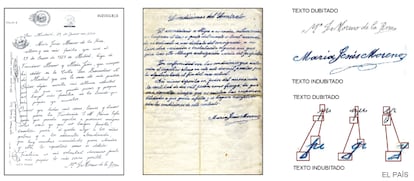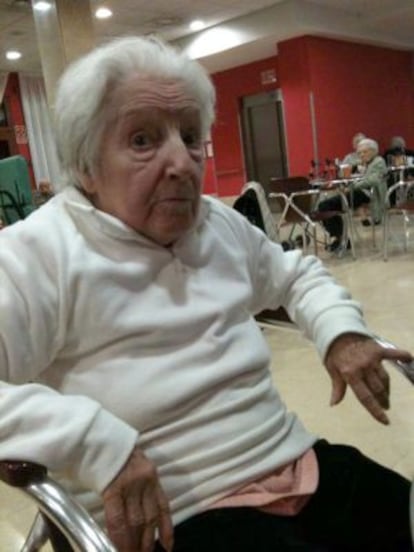Alzheimer’s charity forged patient’s will to keep share of her €3 million fortune
Afal Futuro president admits to fraud over Madrid woman's inheritance in secret recording

A Spanish foundation that cares for people with Alzheimer’s disease forged a wealthy patient’s will in order to donate €3 million to a charity, presumably with the intention of receiving part of the money back.
The president of Fundación Afal Futuro, Blanca Clavijo, is heard admitting to the fraud in a secret recording to which EL PAÍS has had access.
An expert analysis commissioned by this newspaper confirmed that the handwritten testament allegedly written by María Jesús Moreno, in which she donated her fortune to the Queen Sofía Foundation, is a forgery.
The three people who show up as witnesses to the fake document were paid around €1,000 each, sources at the foundation admitted.
Afal Futuro is now being investigated by the Madrid attorney’s office on suspicion that it may have done the same with other patients under its care.
Meanwhile, the Queen Sofía Foundation, which runs several social welfare projects, including one for Alzheimer’s patients, said it has made María Jesús Moreno’s inheritance available to the attorney’s office because “doubts exist regarding its authenticity.”
It’s all phony. I don’t believe she left her money to the queen. She never talked to me about her”
This organization also notes that the will was validated by a court and that this case has damaged its own good name.
María Jesús Moreno became a ward of Afal Futuro in February 2010. By then she was suffering from Alzheimer’s disease and senile squalor syndrome. Moreno was heir to a fortune amassed via piano-making business Hijos de Montano, which thrived in the early 20th century. Upon her death, she had €1.9 million in cash and IOUs derived from the sale of property, plus an additional €1.1 million coming to her from the city of Madrid in compensation for the expropriation of a building in the city center.
The total amount, €3 million, was to go to the Queen Sofía Foundation, according to Moreno’s last will, which was validated by a judge. Moreno died in 2012.
“I want all my things, assets and money to go to Fundación S. M. La Reina de España, so they can help elderly people who are alone like myself,” reads the handwritten document. “Also, if there is anything left over, give it to poor children and abandoned animals.”
The Queen Sofía Foundation says it received €1.7 million from Moreno. A spokesman said the board of trustees decided to let Afal Futuro keep the expropriation money in exchange for the symbolic amount of €1.
Last Christmas, the queen’s foundation told the news site Extraconfidencial that it did this to avoid a legal dispute with the city, “given our excellent institutional relations.”

Meanwhile, Afal has appealed the €1.1-million expropriation compensation set by the Madrid High Court and is demanding €2.2 million instead.
Tomás Alonso de Corcuera, president of the Professional Association of Handwriting Experts and Writing Analysis Technicians, is adamant about his conclusions after analyzing Moreno’s alleged will and some of her other handwritten documents.
“The signature and text were not handwritten by María Jesús Moreno,” he argues. “The text shows graphic signs associated with forgery such as stops, pen lifts, shifts in direction and so on.” He also notes that the forger’s writing speed was “normal to high” whereas Moreno’s was “slow and very controlled.”
The alleged forgery took place between 2011 and 2012, according to sources at Afal. However, the will was dated June 2010. Moreno had been declared legally incapacitated six months earlier. Moreno had allegedly written her last will at the Eulen Santo Domingo senior residence, where she had been taken by Afal Futuro in 2009.
EL PAÍS phoned the three alleged witnesses to the will. Two of them declined to comment, but the third, María Eugenia James Lamigueiro, who is a volunteer at Afal, was heard telling her mother, who picked up the phone, that she should not talk to the press. “Mom, don’t talk to anyone or you’ll get me in trouble.”
An official at Afal Futuro who spoke on condition of anonymity said each witness received between €1,000 and €1,200 for their false testimony. The guest book at the senior residence does not show the names of any of the three on the day they supposedly witnessed the making of Moreno’s will.
For years, Moreno had been living by herself in an enormous apartment inside a building built by her own family near Plaza de España, on San Bernardino street. She lived off the rent money paid by the tenants in the building. The historic building had once housed the Hijos de Montano piano store. In 2011, Afal Futuro sold the building in Moreno’s name for €2.9 million.
Her neighbors and tenants say she was always a dry woman with a difficult character that only got worse as her mental disease progressed. Moreno was unable to care for herself, said one tenant who was on friendly terms with her. In 2009, after residents had made several calls to the emergency services, doctors and social workers decided to get her admitted into Afal. She had neither eaten nor drunk anything for four days, and was found lying on her bed.
Her neighbors say she was a dry woman with a difficult character that got worse as her mental disease progressed
In order to uphold its forged will, Afal commissioned a report from a neurologist who said Moreno’s mental disease was not so disabling that she could not have decided to whom she wanted to leave her assets. Carmen Antúnez, director of the dementia unit at Virgen de la Arrixaca University Hospital in Murcia, is a personal friend of Afal president Clavijo. This report is dated November 11, 2011, 18 months after the will was allegedly written.
The testament was then notarized by Blanca Entrena, who is another personal friend of Clavijo’s.
“It’s all phony. I don’t believe she left her money to the queen, she didn’t even know who she was and never talked to me about her,” says Catherine Tual, who was Moreno’s tenant for 45 years. “A couple of times she mentioned she wanted to leave some of her things to an animal shelter. She loved dogs, cats and birds.”
She and other building residents say Moreno had been unable to put pen to paper for years. “She couldn’t even write out our rent receipts,” notes another tenant.
In the secret recording of a meeting held in November 2013, Blanca Clavijo is heard saying: “Yes, we made María Jesús Moreno de la Rosa’s will […] Was that bad? Strictly speaking it is bad because it is questionable that this lady had the capacity to make her will, but legally Afal is not in danger with this operation because the will has been validated by a judge.”
If Moreno’s will should be declared void, her fortune will go to the state as she has no direct living relatives.
Tu suscripción se está usando en otro dispositivo
¿Quieres añadir otro usuario a tu suscripción?
Si continúas leyendo en este dispositivo, no se podrá leer en el otro.
FlechaTu suscripción se está usando en otro dispositivo y solo puedes acceder a EL PAÍS desde un dispositivo a la vez.
Si quieres compartir tu cuenta, cambia tu suscripción a la modalidad Premium, así podrás añadir otro usuario. Cada uno accederá con su propia cuenta de email, lo que os permitirá personalizar vuestra experiencia en EL PAÍS.
¿Tienes una suscripción de empresa? Accede aquí para contratar más cuentas.
En el caso de no saber quién está usando tu cuenta, te recomendamos cambiar tu contraseña aquí.
Si decides continuar compartiendo tu cuenta, este mensaje se mostrará en tu dispositivo y en el de la otra persona que está usando tu cuenta de forma indefinida, afectando a tu experiencia de lectura. Puedes consultar aquí los términos y condiciones de la suscripción digital.








































